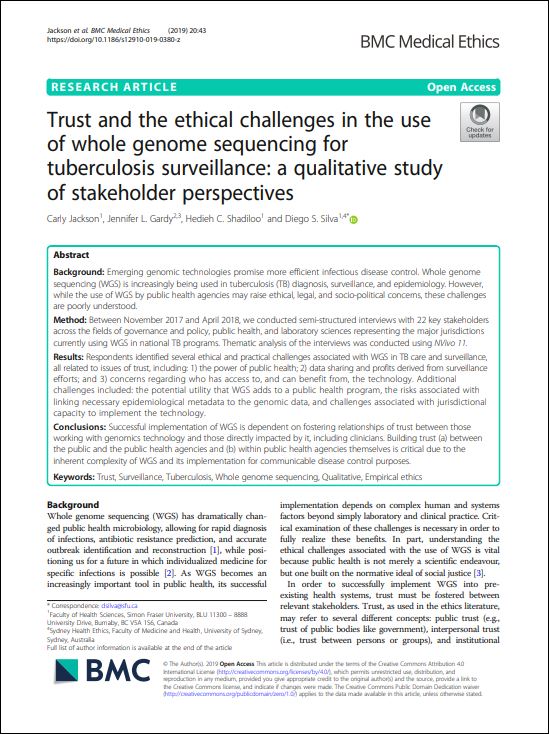Trust and the ethical challenges in the use of whole genome sequencing for tuberculosis surveillance: A qualitative study of stakeholder perspectives

Citation: Jackson, C., Gardy, J.L., Shadiloo, H.C. et al. Trust and the ethical challenges in the use of whole genome sequencing for tuberculosis surveillance: a qualitative study of stakeholder perspectives. BMC Med Ethics 20, 43 (2019). https://doi.org/10.1186/s12910-019-0380-z
Abstract: Background
Emerging genomic technologies promise more efficient infectious disease control. Whole genome sequencing (WGS) is increasingly being used in tuberculosis (TB) diagnosis, surveillance, and epidemiology. However, while the use of WGS by public health agencies may raise ethical, legal, and socio-political concerns, these challenges are poorly understood.
Method
Between November 2017 and April 2018, we conducted semi-structured interviews with 22 key stakeholders across the fields of governance and policy, public health, and laboratory sciences representing the major jurisdictions currently using WGS in national TB programs. Thematic analysis of the interviews was conducted using NVivo 11.
Results
Respondents identified several ethical and practical challenges associated with WGS in TB care and surveillance, all related to issues of trust, including: 1) the power of public health; 2) data sharing and profits derived from surveillance efforts; and 3) concerns regarding who has access to, and can benefit from, the technology. Additional challenges included: the potential utility that WGS adds to a public health program, the risks associated with linking necessary epidemiological metadata to the genomic data, and challenges associated with jurisdictional capacity to implement the technology.
Conclusions
Successful implementation of WGS is dependent on fostering relationships of trust between those working with genomics technology and those directly impacted by it, including clinicians. Building trust (a) between the public and the public health agencies and (b) within public health agencies themselves is critical due to the inherent complexity of WGS and its implementation for communicable disease control purposes.
Emerging genomic technologies promise more efficient infectious disease control. Whole genome sequencing (WGS) is increasingly being used in tuberculosis (TB) diagnosis, surveillance, and epidemiology. However, while the use of WGS by public health agencies may raise ethical, legal, and socio-political concerns, these challenges are poorly understood.
Method
Between November 2017 and April 2018, we conducted semi-structured interviews with 22 key stakeholders across the fields of governance and policy, public health, and laboratory sciences representing the major jurisdictions currently using WGS in national TB programs. Thematic analysis of the interviews was conducted using NVivo 11.
Results
Respondents identified several ethical and practical challenges associated with WGS in TB care and surveillance, all related to issues of trust, including: 1) the power of public health; 2) data sharing and profits derived from surveillance efforts; and 3) concerns regarding who has access to, and can benefit from, the technology. Additional challenges included: the potential utility that WGS adds to a public health program, the risks associated with linking necessary epidemiological metadata to the genomic data, and challenges associated with jurisdictional capacity to implement the technology.
Conclusions
Successful implementation of WGS is dependent on fostering relationships of trust between those working with genomics technology and those directly impacted by it, including clinicians. Building trust (a) between the public and the public health agencies and (b) within public health agencies themselves is critical due to the inherent complexity of WGS and its implementation for communicable disease control purposes.
Author(s): Carly Jackson, Jennifer L. Gardy, Hedieh C. Shadiloo, and Diego S. Silva
Year: 2019
Language: English
Resource Type: Journal Articles
Source: Other
